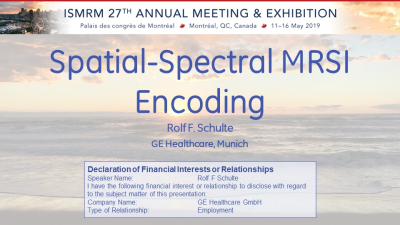Cutting-Edge MR Spectroscopic Imaging
Cutting-Edge MR Spectroscopic Imaging
Weekday Course
Weekday Course
ORGANIZERS: Wolfgang Bogner, Roland Kreis, Malgorzata Marjanska
Wednesday, 15 May 2019
| Room 520A-F | 08:15 - 10:15 | Moderators: Jannie Wijnen, Bernhard Strasser |
Skill Level: Intermediate to Advanced
Session Number: W-03
Overview
This course provides an introduction to new or emerging MR spectroscopic imaging approaches. The session will start with a brief overview of MR spectroscopic imaging basics, followed by an overview of advanced acquisition & reconstruction approaches that make fast high-resolution whole-organ MR spectroscopic imaging clinically feasible.
The following topics will be covered:
- Undersampled MRSI (e.g., parallel imaging, compressed sensing)
- Spatial-spectral MRSI encoding (e.g., Cartesian/non-Cartesian)
- MRSI using spatial-spectral prior knowledge (e.g., SPICE)
- MRSI processing & automation
In-depth discussion will follow with a focus on proton MRSI of the brain, but including also multi-nuclear applications as well as both hardware and field strength dependencies. Applications that benefit from fast 3D MRSI will be presented.
Target Audience
MR scientists and clinicians/neuroscientists interested in the current possibilities and future of the state-of-the-art whole-organ MR spectroscopic imaging for studying normal and pathological brain metabolism as well as diagnosing clinically relevant conditions.
Educational Objectives
As a result of attending this course, participants should be able to:
- Appraise the role of emerging MR spectroscopic imaging techniques for clinically feasible whole-organ metabolic imaging;
- Outline data acquisition and reconstruction requirements for effective application of these techniques; and
- Summarize the metabolic and other parameters that can be mapped in a clinical and/or research setting using MR spectroscopic imaging.
Overview
This course provides an introduction to new or emerging MR spectroscopic imaging approaches. The session will start with a brief overview of MR spectroscopic imaging basics, followed by an overview of advanced acquisition & reconstruction approaches that make fast high-resolution whole-organ MR spectroscopic imaging clinically feasible.
The following topics will be covered:
- Undersampled MRSI (e.g., parallel imaging, compressed sensing)
- Spatial-spectral MRSI encoding (e.g., Cartesian/non-Cartesian)
- MRSI using spatial-spectral prior knowledge (e.g., SPICE)
- MRSI processing & automation
In-depth discussion will follow with a focus on proton MRSI of the brain, but including also multi-nuclear applications as well as both hardware and field strength dependencies. Applications that benefit from fast 3D MRSI will be presented.
Target Audience
MR scientists and clinicians/neuroscientists interested in the current possibilities and future of the state-of-the-art whole-organ MR spectroscopic imaging for studying normal and pathological brain metabolism as well as diagnosing clinically relevant conditions.
Educational Objectives
As a result of attending this course, participants should be able to:
- Appraise the role of emerging MR spectroscopic imaging techniques for clinically feasible whole-organ metabolic imaging;
- Outline data acquisition and reconstruction requirements for effective application of these techniques; and
- Summarize the metabolic and other parameters that can be mapped in a clinical and/or research setting using MR spectroscopic imaging.
| 08:15 |
MRS Data Acquisition from Irregularly Shaped Regions by Coil Sensitivity Heterogeneity
Li An, Jun Shen
This talk focuses on a recently developed technique (SPLASH) for rapid spatial localization of irregularly shaped regions using high-resolution anatomical imaging and sensitivity heterogeneity of phased array coils. Fast MRS data acquisition and reconstruction of ischemic and healthy tissue compartments are demonstrated.
|
|
| 08:45 |
MRSI Using Spatial-Spectral Prior Knowledge Video Permission Withheld
Zhi-Pei Liang, Fan Lam
Recently, several novel methods that exploit spatiospectral priors have been developed to address the dimensionality, sensitivity and nuisance signal challenges of MR spectroscopic imaging, and enabled significantly improved combinations of speed, resolution, SNR and organ coverage. This talk will review the new low-dimensional models, special acquisition and reconstruction strategies underlying these exciting developments, as well as potential neuroscience and clinical applications of these new techniques. Current limitations and future research opportunities will also be discussed.
|
|
| 09:15 |
MRSI Processing & Automation
Brian Soher
This section of the course provides an overview of the processing requirements required by emerging MR spectroscopic imaging approaches and describes a roadmap towards their automation and adoption within a clinical context.
|
|
| 09:45 |
 |
Spatial-Spectral MRSI Encoding
Rolf Schulte
This lecture introduces different spectral-spatial sampling schemes for 1H as well as x-nuclei MRSI. These are Cartesian and non-Cartesian k-space trajectories as well as additional ways of encoding spatial information. Advantages and disadvantages are discussed, and a few examples are shown.
|
| 10:15 |
Adjournment |
 Back to Program-at-a-Glance |
Back to Program-at-a-Glance |  Back to Top
Back to Top